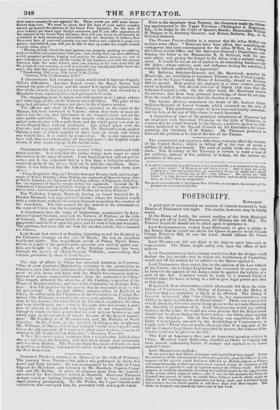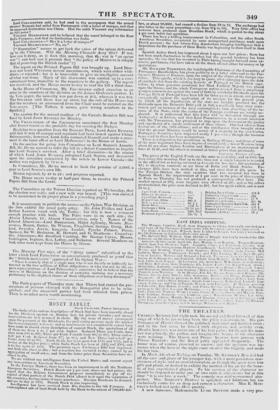POSTSCRIPT •
SATURDAY.
A good deal of conversation on matters of interest occurred in both Houses of Parliament last night. The results, however, may be briefly stated.
In the House of Lords, the second reading of the Irish Municipal Bill was put off by Lord MennouoNn, till Monday the 4th May. The Premier hoped he should not be asked again to postpone it.
Lord ELLENBOROU011 wished Lord Melbourne to give a pledge to the House, that he would not advise the Queen to assent to the Canada Clergy Reserves Bill, in ease the Lords should address the Crown against the bill.
Lord MELBOURNE did not think it his duty to enter into such an engagement. The House might safely rely upon the effect of their address.
Lord ELLENBOUOUGII had a strong conviction that the Judges would declare the Act invalid ; and he hoped the Archbishop of Canterbury would put off his motion for an address to the Queen against it.
Lord 3leenoumeit then stated, that in the opinion of the Law Officers of the Crown, the Colonial Legislature had exceeded its powers; and he believed the opinion of the Judges must be against the validity of a part of the Act. A motion would be made by a learned friend in another place for leave to bring in a bill to give legal power and effect to that part.
It appeared from observations which afterwards fell from the Arch-
bishop or CANTERBURY, the Bishop of LONDON, and the Bishop of Exrrhit, that a compromise is likely to be effected. 'Fite Bishop of Lon oos intinieted, that " the Church, by, her representatives, was willing to open negotiations on liberal terms. ' There was a great deal of talk about the Crown's assent tieing given to the act notwithstanding the illegality of portions of it. Lord MELnounNtr, would any nothing decisive on the point : he would not even promise that the Royal assent shoeld not le: given during the Easter recess—the thirty days expiring within the holy days. But all this fencing was superfluous, for the LORD CilAscui,Lon, pressed by the Archbishop of CANTERBURY, at length said, " There was no doubt whatever, that if in any part of the bill the Colonial Legislature had exceeded its powers, the consent of the CEO test could not be given to the bill."
The Earl of ABERDEEN then put an important question relative to China. He asked lewd Melbourne, whether an Order in Council had been passed, authorizing letters of marque mid reprisal to be issued against China?
Lord Melesounst; replied-
lt was not a fact that letters of marque and reprisal bad been issued. It was the ilitelltlins of Clue Covernment to demand reparntion from the Chinese in con- sequence of th injories which. Foul &en itylicOrl on British sulerets in China; and unquestionably, if that reporation were ref used, it nos the intention of this Government to proceed to (lots of reprisal affitinst the Chinese trade. For that purpose, it would he absolutely ilecessary to eetablish courts for the adjudication of the vessels which might be taken ; and it was for this purpose the Order in Council wan passed, in order to enable those Chinese vemsels which might be taken, in the contingency of reparation not being •missile and hostilities being bud recourse to—to enable parties to sell those ships and their cargoes. The Order in Council was passed the latter end or last week. Lord COLCHESTER said, be had read in the newspapers that the armed steamer Nemesis had sailed from Portsmouth with a letter of marque, and that its supposed destination was aline. Had the noble Viscount any information
on this point ?
VISColUlt MELBOURNE said he believed that the vessel belonged to the East
India Company, and that its destination was India.
Lord Co r,e ESTER—" [IRS it a letter of marque ?"
Viscount itlEcnouRNE—" No, no."
["Reparation" means to get back the value of the opium delivered up to the Chinese. Will the Morning Chrottiele deny this? If not, how can it deny, as it does this morning, that th.! war is "an vim war"? and how can it pretend that "the policy of Ministers is simply that of protecting the British trader " ?] The report on the Printed Papers Bill was brought up. Lord DEN- MAN and Lord WYNFORD moved amendments, which were either with. drawn tat rejected ; but it is impossible to give an intelligible account of what was done. Much of the discussion was carried on in a con- versational tone, inaudible to the reporters in the gallery. The report was received, and the House meets to-day to read the bill a third time.
In the House of Commons, Mr. FRESHF1ELD called attention to an error in the numbers of the division on Sir James Graham's motion. In the Vote-paper, the minority was put down at 261, whereas it was 262. The SPEAKER said there was an error, but the rule of the House was that the numbers as announced from the Chair must be entered on the Vote-paper. [The Tellers, it seems, gave wrong numbers to the Speaker.] The motion for the second reading of the Canada Reunion Bill was fixed by Lord JOHN Russtaa. for :Monday.
The CHANCELLOR of the EXCHEQumt mentioned the first Monday after Easter recess as the probable day for opening the Budget. Replying to a question from Sir Roma PBEt„ Lord Jonx IlitssEst. said that le•ters of marque and reprisals had been issued against China. Subsequently, however, Lord John corrected himself, and made a state- ment to the same effect as Lord Melbourne's in the House of Lords. On the motion for going into Committee on Lcrd Seaton's Annuity Bill, Mr. firME moved to refer the bill to a Select Committee to inquire into Lord Seaton's services. After a brief discussion—in the course of whieh Lord JOHN RussEr.t. eulogized Lord Seaton, and descanted upon the atrocities committed by the rebels in Lower Canada—the motion was rejected, by 79 to 8.
In Committee, Mr. Homo moved to limit the pension of 2,000/. a year to Lord Seaton's own life.
Motion rejected, by 48 to 22 ; and progress reported.
The House meets to-day at half-past three, to receive the Printed Papers Bill from the Lords.



























 Previous page
Previous page